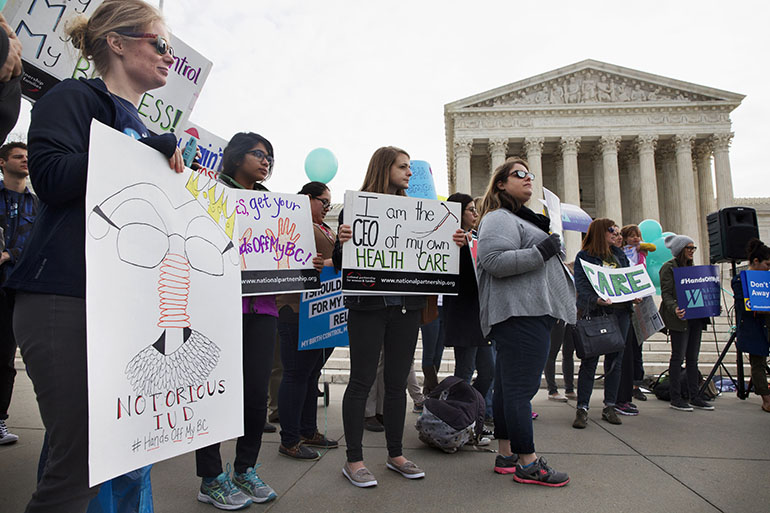An apparently deadlocked Supreme Court is asking lawyers in a closely watched health law case to provide more information on how women working for religious employers might be able to get insurance coverage for contraception without violating the rights of their bosses.
The order also included a request for information about a scenario that might be a possible compromise in the case.
At issue in Zubik v. Burwell is an “accommodation” created by the Obama administration to a provision of the Affordable Care Act that otherwise requires most employers to provide female workers access to coverage of FDA-approved contraception with no copay.
Houses of worship are exempt from the requirement to provide contraceptive coverage, but religiously affiliated organizations (such as hospitals, universities and social service agencies) are required to submit information to their insurer or the government stating their religious objection. The insurer is then required to provide the coverage, under the accommodation.
The religious organizations that are suing, however, claim that the act of notifying the government or their insurance companies facilitates the coverage being provided, making them “complicit” in what they consider sinful.
The eight Supreme Court justices at last week’s oral arguments appeared evenly divided over whether the requirement represented a “substantial burden” on the organizations’ religious freedoms. (All but one lower court said it did not.) A 4-4 tie in the case (the seat of the late Justice Antonin Scalia remains vacant) would leave the lower court rulings intact unless the court opts to take up the issue after Scalia’s seat is filled. It also would create an unusual situation in which the rules would be enforced in most areas of the country, but not all.
The order issued Tuesday asked lawyers on both sides of the case to “file supplemental briefs that address whether and how contraceptive coverage may be obtained by petitioners’ employees through petitioners’ insurance companies, but in a way that does not require any involvement of petitioners beyond their own decision to provide health insurance without contraceptive coverage to their employees.” The final deadline for the new briefs is April 20.
As for the potential compromise, the justices asked the lawyers specifically if the religious organizations might inform their insurers when initially contracting for insurance that they do not wish to offer contraceptive coverage. At that point, the insurance company, “aware that petitioners are not providing certain contraceptive coverage on religious grounds — would separately notify petitioners’ employees that the insurance company will provide cost-free contraceptive coverage, and that such coverage is not paid for by petitioners and is not provided through petitioners’ health plan.”
Interestingly, those on both sides of the case say they were heartened by the latest turn of events.
“I find it encouraging that they’re asking for more information about how to ensure that women get contraception in their health plans,” said Brigitte Amiri, senior staff attorney for the American Civil Liberties Union. Seeking a potential compromise, she said, “seems to recognize that taking contraception out of health plans is harmful.”
David Cortman, senior counsel for the Alliance Defending Freedom and the attorney representing two of the religious organizations suing the government, said he also finds the request to be “a positive development.”
“The court addressed the very arguments that we’ve been making all along, of being complicit,” he said, and the justices appear to be making an effort to find some way to ensure that the benefits are provided, but the organizations are not required to violate their religious tenets in order for that to happen.”
Cortman would not say whether the potential compromise raised in the order would be acceptable to his clients. “If it is truly outside of our health insurance plan and doesn’t make the client complicit, that’s what we’ve suggested,” he said.







